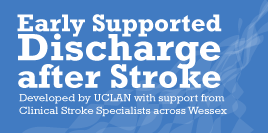 |
Aphasia |
Recommendations 6.20.1.1
A. All patients with communication problems following stroke should have an initial assessment by a speech and language therapist to diagnose the communication problem and to explain the nature and implications to the patient, family and multidisciplinary team. Routine reassessment of the impairment or diagnosis in the early stages of stroke (immediate and up to four months) should not be performed unless there is a specific purpose, e.g. to assess mental capacity.
B. In the early stages of stroke (immediate and up to four months) patients identified as having aphasia as the cause of the impairment should be given the opportunity to practice their language and communication skills as tolerated by the patient.
C. Beyond the early stages of stroke (immediate and up to four months), patients with communication problems caused by aphasia should be reassessed to determine if they are more suitable for more intensive treatment with the aim of developing greater participation in social activities. This may include a range of approaches such as using an assistant or volunteer, family member or communication partner guided by the speech and language therapist, computer-based practice programmes and other functional methods.
D. Patients with impaired communication should be considered for assistive technology and communication aids by an appropriately trained clinician.
E. Patients with aphasia whose first language is not English should be offered assessment and communication practice in their preferred language.
F. Education and training of health/social care staff, carers and relatives regarding the stroke patient's communication impairments should be provided by a speech and language therapist. Any education and training should enable communication partners to use appropriate communication strategies to optimise patient engagement and choice, and the delivery of other rehabilitation programmes.
G. Any person with stroke at home who has continuing communication difficulty due to aphasia and whose social interactions are limited by it should be provided with information about any local or national groups for people with long-term aphasia and referred to the group as appropriate.
Sources 6.20.1.2
A. Brady et al 2012; Bowen et al 2012; consensus
B. Brady et a. 2012; Bowen et al 2012; Godeke 2011; de Jong Hagelstein 2012
C. Brady et al 2012; consensus
D. Consensus
E. Consensus
F. Kagan et al 2001; consensus
G. Consensus
 |